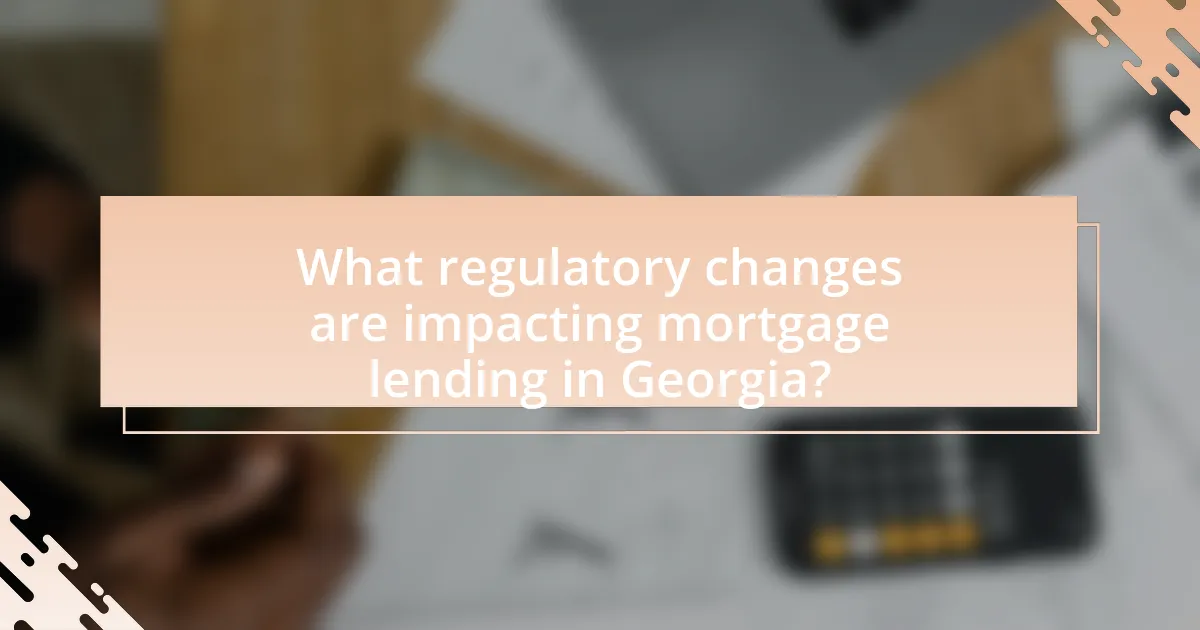The article focuses on the trends in mortgage lending in Georgia for 2023, highlighting significant changes such as rising interest rates, increased demand for adjustable-rate mortgages, and the adoption of digital lending solutions. It examines how interest rates have influenced borrowing costs and mortgage applications, with current rates ranging from 6.5% to 7.5% for 30-year fixed mortgages. The article also discusses the growing popularity of government-backed loans and the impact of demographic shifts, particularly among millennials and minority populations, on the housing market. Additionally, it addresses the regulatory changes affecting lenders and borrowers, compliance challenges, and best practices for securing mortgage approval in Georgia.

What are the current trends in mortgage lending in Georgia for 2023?
In 2023, the current trends in mortgage lending in Georgia include a rise in interest rates, increased demand for adjustable-rate mortgages, and a focus on digital lending solutions. The Federal Reserve’s monetary policy has led to higher mortgage rates, which has shifted borrower preferences towards adjustable-rate options that offer lower initial payments. Additionally, lenders are increasingly adopting technology to streamline the application process, improve customer experience, and enhance efficiency. According to the Mortgage Bankers Association, the share of adjustable-rate mortgages has grown significantly, reflecting borrowers’ responses to the changing interest rate environment.
How have interest rates impacted mortgage lending in Georgia?
Interest rates have significantly impacted mortgage lending in Georgia by influencing borrowing costs and demand for home loans. As interest rates rise, the cost of borrowing increases, leading to a decrease in mortgage applications and home purchases. For instance, in 2022, the average interest rate for a 30-year fixed mortgage rose to over 7%, resulting in a 30% decline in mortgage applications compared to the previous year. Conversely, lower interest rates typically stimulate demand, as seen in 2020 when rates fell below 3%, leading to a surge in refinancing and new home purchases. This relationship between interest rates and mortgage lending is critical in understanding the housing market dynamics in Georgia.
What are the current interest rates for mortgages in Georgia?
As of October 2023, the current interest rates for mortgages in Georgia typically range from 6.5% to 7.5% for a 30-year fixed-rate mortgage. This range reflects the broader national trends influenced by the Federal Reserve’s monetary policy and economic conditions. According to data from the Mortgage Bankers Association, these rates have shown a slight increase compared to previous months, aligning with the ongoing adjustments in the financial markets.
How do these rates compare to previous years?
In 2023, mortgage rates in Georgia are significantly higher compared to previous years. For instance, the average mortgage rate in 2020 was approximately 3.0%, while in 2021 it rose to around 3.5%. By 2022, rates increased further to about 4.5%, and in 2023, they have reached approximately 6.5%. This upward trend reflects broader economic conditions, including inflation and Federal Reserve interest rate hikes, which have impacted borrowing costs across the board.
What types of mortgage products are gaining popularity in Georgia?
In Georgia, adjustable-rate mortgages (ARMs) and government-backed loans, particularly FHA and VA loans, are gaining popularity. ARMs are appealing due to their lower initial interest rates, which can make homeownership more accessible in a rising interest rate environment. FHA loans are favored for their lower down payment requirements, while VA loans offer benefits to veterans, including no down payment and competitive rates. These trends reflect a shift towards more flexible and affordable mortgage options in response to the current housing market dynamics in Georgia.
Which mortgage types are most commonly used by borrowers in 2023?
In 2023, the most commonly used mortgage types by borrowers are fixed-rate mortgages and adjustable-rate mortgages (ARMs). Fixed-rate mortgages are favored for their stability, offering consistent monthly payments over the loan term, while ARMs attract borrowers with lower initial rates that can adjust over time. According to the Mortgage Bankers Association, approximately 70% of new mortgage applications in 2023 were for fixed-rate loans, reflecting a strong preference for predictable payments amid fluctuating interest rates.
What are the advantages of these popular mortgage products?
The advantages of popular mortgage products include lower interest rates, flexible repayment options, and potential tax benefits. Lower interest rates make homeownership more affordable, allowing borrowers to save money over the life of the loan. Flexible repayment options, such as adjustable-rate mortgages, can provide lower initial payments, making it easier for buyers to enter the housing market. Additionally, mortgage interest may be tax-deductible, which can further reduce the overall cost of borrowing. These factors contribute to the attractiveness of various mortgage products in the current lending landscape.
How is technology influencing mortgage lending in Georgia?
Technology is significantly influencing mortgage lending in Georgia by streamlining processes and enhancing customer experience. Digital platforms enable faster loan applications, reducing the time from application to approval, which is crucial in a competitive market. For instance, automated underwriting systems assess borrower risk more efficiently, leading to quicker decisions. Additionally, the use of online tools and mobile apps allows borrowers to manage their loans and access information easily, contributing to increased transparency and convenience. According to a 2023 report by the Mortgage Bankers Association, 75% of lenders in Georgia have adopted some form of digital technology, indicating a strong trend towards modernization in the industry.
What technological advancements are being adopted by lenders?
Lenders are adopting several technological advancements, including artificial intelligence (AI), blockchain, and digital platforms for loan processing. AI enhances credit risk assessment and automates customer service through chatbots, improving efficiency and customer experience. Blockchain technology is being utilized for secure and transparent transactions, reducing fraud risks and streamlining the mortgage process. Additionally, digital platforms enable lenders to offer online applications and e-signatures, significantly speeding up the loan approval process. According to a 2023 report by the Mortgage Bankers Association, 70% of lenders have integrated at least one of these technologies to improve operational efficiency and customer satisfaction.
How do these technologies improve the lending process for consumers?
Technologies improve the lending process for consumers by enhancing efficiency, reducing costs, and increasing accessibility. For instance, automated underwriting systems expedite loan approvals by analyzing vast amounts of data quickly, which can decrease the time to close a loan from weeks to days. Additionally, digital platforms enable consumers to apply for loans online, providing convenience and allowing for 24/7 access to services. According to a report by the Consumer Financial Protection Bureau, the use of technology in lending has led to a 30% reduction in processing times, demonstrating a significant improvement in the overall consumer experience.

What demographic shifts are affecting mortgage lending in Georgia?
Demographic shifts affecting mortgage lending in Georgia include an increase in the state’s minority population, particularly among Hispanic and Black communities, which has led to a growing demand for homeownership. According to the U.S. Census Bureau, Georgia’s Hispanic population grew by 29% from 2010 to 2020, while the Black population remains a significant demographic, comprising over 32% of the state’s total population. This diversification is influencing lenders to adapt their products and services to meet the needs of these groups, including offering more inclusive lending practices and tailored financial education programs. Additionally, younger generations, particularly millennials and Gen Z, are entering the housing market, prompting lenders to innovate with technology-driven solutions and flexible financing options to attract these first-time homebuyers.
How are first-time homebuyers shaping the mortgage market?
First-time homebuyers are significantly shaping the mortgage market by increasing demand for affordable loan products and influencing lending practices. In 2023, this demographic accounted for approximately 43% of all home purchases in the United States, highlighting their substantial presence in the market. Their preference for lower down payment options and government-backed loans, such as FHA loans, has prompted lenders to adapt their offerings to meet these needs. Additionally, first-time homebuyers are driving innovation in digital mortgage solutions, as they tend to favor online applications and streamlined processes, which has led to increased competition among lenders to enhance user experience and efficiency.
What challenges do first-time homebuyers face in Georgia?
First-time homebuyers in Georgia face several challenges, including high home prices, limited inventory, and stringent lending requirements. The median home price in Georgia has increased significantly, making affordability a major concern for new buyers. Additionally, the inventory of homes available for sale is often low, leading to increased competition and bidding wars. Furthermore, lenders may impose strict credit score and debt-to-income ratio requirements, making it difficult for first-time buyers to secure financing. These factors collectively create a challenging environment for individuals looking to purchase their first home in Georgia.
What programs are available to assist first-time homebuyers?
Various programs are available to assist first-time homebuyers, including federal, state, and local initiatives. The Federal Housing Administration (FHA) offers loans with lower down payment requirements, while the U.S. Department of Agriculture (USDA) provides zero-down payment loans for eligible rural areas. Additionally, Georgia offers the Georgia Dream Homeownership Program, which provides down payment assistance and affordable mortgage options. These programs aim to make homeownership more accessible by reducing financial barriers for first-time buyers.
What role do millennials play in the current mortgage landscape?
Millennials are a significant force in the current mortgage landscape, representing a growing segment of homebuyers. As of 2023, they account for approximately 43% of all mortgage applications, reflecting their increasing participation in the housing market. This demographic is driving demand for affordable housing options and influencing lending practices, as lenders adapt to their preferences for digital services and flexible financing solutions. Additionally, millennials are more likely to seek first-time homebuyer programs, which cater to their financial situations and aspirations for homeownership.
How are millennials’ preferences influencing mortgage lending practices?
Millennials’ preferences are significantly influencing mortgage lending practices by driving demand for digital solutions and flexible loan options. This generation prioritizes technology, leading lenders to adopt online applications, automated processes, and mobile-friendly platforms to enhance user experience. According to a 2022 survey by the National Association of Realtors, 97% of millennials used online resources during their home search, indicating a strong preference for digital engagement. Additionally, millennials favor lower down payment options and alternative credit assessments, prompting lenders to offer products like FHA loans and programs that consider non-traditional credit histories. This shift reflects a broader trend in the mortgage industry to adapt to the unique needs and behaviors of younger borrowers.
What specific needs do millennials have when seeking mortgages?
Millennials seeking mortgages prioritize affordability, flexibility, and digital accessibility. They often require lower down payment options, as many are burdened by student debt, with 54% of millennials indicating that saving for a down payment is a significant barrier to homeownership. Additionally, they value streamlined online processes for mortgage applications and approvals, reflecting their comfort with technology. A survey by the National Association of Realtors in 2022 found that 87% of millennials prefer to conduct their mortgage research online, highlighting the importance of digital tools in their decision-making process.

What regulatory changes are impacting mortgage lending in Georgia?
Recent regulatory changes impacting mortgage lending in Georgia include the implementation of stricter guidelines for loan origination and underwriting processes. These changes are primarily driven by the Georgia Department of Banking and Finance, which has introduced new compliance requirements aimed at enhancing consumer protection and ensuring transparency in lending practices. For instance, the updated regulations mandate clearer disclosures regarding loan terms and fees, which are designed to prevent predatory lending practices. Additionally, the state has increased oversight on mortgage brokers and lenders to ensure adherence to these new standards, reflecting a broader trend towards more stringent regulatory frameworks in the mortgage industry.
How have recent regulations affected lenders and borrowers?
Recent regulations have tightened lending standards, impacting both lenders and borrowers by increasing compliance costs and limiting access to credit. Lenders are now required to adhere to stricter underwriting guidelines and enhanced disclosure requirements, which can lead to longer processing times and reduced loan availability. For borrowers, these regulations often result in higher interest rates and more stringent qualification criteria, making it more challenging to secure financing. According to the Consumer Financial Protection Bureau, these changes aim to protect consumers but can inadvertently restrict access to mortgage loans, particularly for first-time homebuyers and those with lower credit scores.
What are the key regulatory changes introduced in 2023?
In 2023, key regulatory changes in Georgia’s mortgage lending landscape included the implementation of stricter lending standards and enhanced consumer protection measures. These changes were aimed at increasing transparency in the mortgage process and reducing the risk of predatory lending practices. For instance, the Georgia Department of Banking and Finance introduced new guidelines requiring lenders to provide clearer disclosures regarding loan terms and fees, which aligns with national trends toward greater consumer advocacy in financial services. Additionally, the state adopted regulations that mandated additional training for mortgage brokers to ensure compliance with these new standards, reflecting a commitment to improving borrower education and safeguarding against potential abuses in the lending process.
How do these changes aim to protect consumers?
The changes in mortgage lending regulations aim to protect consumers by enhancing transparency and reducing predatory lending practices. These regulations require lenders to provide clearer disclosures about loan terms, interest rates, and fees, enabling consumers to make informed decisions. For instance, the implementation of stricter guidelines on adjustable-rate mortgages helps prevent sudden payment increases that could lead to defaults. Additionally, the introduction of mandatory training for loan officers ensures that they are better equipped to advise consumers, thereby reducing the likelihood of misleading information. These measures collectively contribute to a safer lending environment for consumers in Georgia.
What compliance challenges do lenders face in Georgia?
Lenders in Georgia face several compliance challenges, primarily due to the complex regulatory environment that includes both federal and state laws. These challenges include navigating the requirements of the Dodd-Frank Act, which imposes strict regulations on mortgage lending practices, and adhering to the Georgia Residential Mortgage Act, which governs licensing and operational standards for lenders. Additionally, lenders must ensure compliance with the Truth in Lending Act and the Real Estate Settlement Procedures Act, which mandate transparency in loan terms and settlement processes. The interplay of these regulations can lead to increased operational costs and the risk of penalties for non-compliance, making it essential for lenders to maintain robust compliance programs and stay updated on regulatory changes.
How are lenders adapting to meet new compliance requirements?
Lenders are adapting to meet new compliance requirements by implementing advanced technology solutions and enhancing their training programs. For instance, many lenders are adopting automated compliance management systems that streamline the monitoring of regulatory changes and ensure adherence to new laws. According to a report by the Mortgage Bankers Association, 75% of lenders have increased their investment in compliance technology in 2023, reflecting a proactive approach to managing regulatory risks. Additionally, lenders are providing ongoing education and training for their staff to keep them informed about the latest compliance standards, which is crucial for maintaining operational integrity and avoiding penalties.
What resources are available to help lenders navigate these challenges?
Lenders can utilize various resources to navigate challenges in mortgage lending, including industry associations, regulatory agencies, and technology platforms. Industry associations like the Mortgage Bankers Association provide educational resources, advocacy, and networking opportunities that help lenders stay informed about market trends and regulatory changes. Regulatory agencies, such as the Consumer Financial Protection Bureau, offer guidelines and compliance resources that assist lenders in understanding legal requirements. Additionally, technology platforms like loan origination systems and data analytics tools enhance operational efficiency and decision-making, enabling lenders to adapt to evolving market conditions effectively.
What best practices should borrowers follow when applying for a mortgage in Georgia?
Borrowers in Georgia should follow several best practices when applying for a mortgage, including improving their credit score, gathering necessary documentation, and shopping around for the best rates. A higher credit score can lead to better loan terms, as lenders typically offer lower interest rates to borrowers with scores above 700. Collecting documents such as tax returns, pay stubs, and bank statements is essential for a smooth application process, as lenders require this information to assess financial stability. Additionally, comparing offers from multiple lenders can help borrowers secure the most favorable terms, as rates and fees can vary significantly. According to the Consumer Financial Protection Bureau, borrowers who compare at least three mortgage offers can save thousands over the life of the loan.
How can borrowers improve their chances of mortgage approval?
Borrowers can improve their chances of mortgage approval by maintaining a strong credit score, ideally above 700, as lenders typically favor borrowers with higher scores. A strong credit score demonstrates reliability in repaying debts, which is crucial for lenders assessing risk. Additionally, borrowers should reduce their debt-to-income ratio to below 43%, as this ratio indicates financial stability and the ability to manage monthly payments. Providing a substantial down payment, ideally 20% or more, can also enhance approval chances by reducing the lender’s risk. Furthermore, borrowers should ensure all financial documents are accurate and complete, as discrepancies can lead to delays or denials. These strategies are supported by data from the Consumer Financial Protection Bureau, which shows that borrowers with higher credit scores and lower debt-to-income ratios are significantly more likely to receive mortgage approval.
What documents are essential for a smooth mortgage application process?
Essential documents for a smooth mortgage application process include proof of income, credit history, employment verification, tax returns, bank statements, and identification. These documents provide lenders with a comprehensive view of the applicant’s financial situation, ensuring accurate assessment of creditworthiness. For instance, proof of income, such as pay stubs or W-2 forms, confirms the applicant’s ability to repay the loan, while tax returns offer insight into overall financial stability. Bank statements demonstrate available assets, and identification verifies the applicant’s identity, which is crucial for compliance with lending regulations.